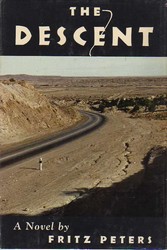
Order, which had ceased to exist until the sudden, unexpected arrival of a State Police car on a routine highway patrol, had come slowly, with monotonous, routine efficiency, out of the chaos of the accident back into the lives of the people involved. Bodies were extricated from the wreckage, wreckers and ambulances arrived, cars were moved, a single lane was cleared through the tangle of the accident and through traffic was pushed relentlessly on its way.
Twenty miles south of the scene of the accident, in the corridor of the hospital outside of the emergency room, the combined smells of blood, sweat, medicine, cigar smoke (from the cigar of one of the policemen), and the sickeningly sweet odor of burnt flesh mingled with the sublter odors of fear and death.
Reality, the fundamental, basic reality of life, had been imposed upon everyone involved in the accident for at least a short time. The dreams, illusions and enchantments, the superficial aims and purposed, desires and wishes, of the victims and the spectators were stripped away by the shock, leaving only the human essentials. The veneer of civilization that passes for human dignity had — for a time — ceased to exist.
For the doctor, supervisor, nurses, orderlies, ambulance drivers, and even the police, the aim and the purpose — as much because of habit as for any other reason — was not only to preserve life, but to restore order and security, to efface the accident by removing all its traces.
With the debris cleared from the road, the night, the land and the hill remained; indifferent to what had taken lace, ready for the next time. Except for the people directly involved, who would continue to reverberate to the consequences of the accident until such time as their wounds were healed and their habitual life reestablished, the accident became in the course of the night just one more even recorded in the reports of the Safety Council, reported in the newspapers, added to the columns of the statisticians.
Review
- Manas Journal, 29 December 1954
- Fritz Peters’ Descent continues this unusual writer’s exploration of uncommon subjects. His World Next Door, a story of insanity and recovery, received considerable attention in MANAS, since the philosophic overtones of the book were so striking. Later, Peters undertook a story of homosexuality, Finistère, which departed from the norm of the few books dealing with that topic in several respects — principally by neglecting no psychological dimension, and avoiding a thesis or theory. Descent is a novel about an automobile accident, in which each one injured or killed is shown to have created the conditions drawing him toward the tangled wreckage, months — even years — before the crash actually occurred.
Those who have read J. W. Dunne’s Experiment with Time may suspect that Mr. Peters has read it, too, and has for some time been wondering about the psychological meaning of such terms as “fate,” “nemesis,” “karma,” etc. The fatalism implied by the sequence of events in Descent, however, is conditional, since some persons only come close to the tragedy, being warned by strong premonitions in sufficient time to avoid death or serious injury. After the accident happens — the reader somehow knows all through the book that in a sense it is “real” before it takes place, and that each sufferer has contributed to its occurrence — one who escapes muses about the subconscious warning which was his own salvation:
He could understand, somehow, that nature required death of every living organism. It demanded its quota through sickness, disease, old age, manifestations of violence, volcanoes, floods, storms . . . but in all of these things there was a curious logic; creation and destruction were nature’s prerogatives, they could not be questioned.
What made no sense to him, what robbed life of any apparent purpose and design, was man’s own war against man. Not only armies of men fighting each other, but the so-called accidents, the murders, the suicides . . . Why had it had to happen? Why to those people? It could not, in his mind, be resolved — as it would be for the police with their facts and reports — by finding out who had caused it. There was something more than any human action involved. Why had Dorothy Simms tried to pass that truck then? Why had Stephen Williams passed him? What series of coincidences, what acts of fate, had selected this group of people? What was it that had protected him?
The warning — and his feeling of alarm was unmistakably that — had stopped him just in time. He had felt the approach of death — even if he had not known at the moment what it was — reaching out for him, like a huge hand with fingers outspread, for all of them. Had it been just for him, then, or had it come too late for the others? Either it had not been quite big enough to get them all, or else it had not been intended to reach them . . . yet.
Find out more
- You can find out more about Fritz Peters, his life, and his books, at: www.frizpeters.info

http://www.arsenalpulp.com/select_book.php?book=230
And in September, the above publisher reissues Peters’ second and best-known novel Finistiere.